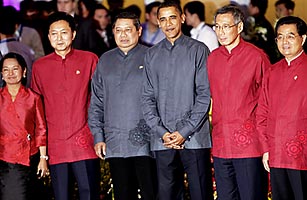
Dressed to Impress
President Barack Obama, center, stands with other APEC leaders for a group photograph following their evening dinner in Singapore.
The annual Asia-Pacific Economic Cooperation summit (APEC) isn't generally the place for earth-shaking diplomacy. The event's biggest achievement is usually getting world leaders to dress up in the native garb of the hosting country, which is why President Barack Obama, Chinese President Hu Jintao and others found themselves wearing colorful designer shirts from Singapore this weekend.
It's fitting, then, that some of the most significant diplomatic news coming out of APEC in Singapore was an agreement not to do something. Confirming doubts that had been growing for months, the world leaders in attendance at APEC — along with Danish Prime Minister Lars Lokke Rasmussen — announced on Sunday morning that a legally binding deal on climate change would be impossible to achieve at the U.N. summit on global warming in Copenhagen next month.
Instead, in Copenhagen, diplomats will aim to reach a less aggressive — and much less specific — "politically binding" agreement, with the hope that hard numbers and legal obligations to reduce climate change would be added soon, in a two-step approach. "There was an assessment by the leaders that it was unrealistic to expect a full internationally legally binding agreement to be negotiated between now and when Copenhagen starts in 22 days," said Mike Froman, Obama's deputy national security adviser.
The news comes as little surprise to climate change experts, who have watched as the ultimate goal of the Copenhagen summit has been steadily scaled back to meet political realities. A year ago, the expectation was for diplomats in Copenhagen to negotiate — and sign — a true global successor to the Kyoto Protocol, which expires in 2012. Today, the best the world can hope for are more words about the importance of fighting climate change.
The reason is simple: the deadlock between developed nations and developing ones. Developing nations refuse most responsibility for climate change, arguing that warming is primarily the fault of rich industrialized countries, and want the developed world to take on strict short-term emissions reduction targets. Developed nations, led by the U.S., argue that fast-growing developing nations like China and India will emit the vast majority of future carbon emissions, and that any deal that exempts them from action — as the Kyoto Protocol did — is a farce. Despite months of negotiations in Barcelona, Bangkok and other world cities, that gap remains vast.
At the same time, the failure of the U.S. Senate to pass carbon cap legislation leaves American negotiators in a difficult position at Copenhagen. The Obama Administration has been very clear that it will not accept binding emissions targets on a global deal until Congress has accepted domestic cuts at home. (Any climate treaty would have to be endorsed by the Senate.) With the legislative calendar packed, there was no chance that the Senate would act before Copenhagen begins next month. The deal was already dead — the decision at APEC just made it official.
If there is a bright side, however, the deliberate downshift in expectations for Copenhagen could make it easier for world leaders, including Obama, to attend the summit and draft a stronger political agreement. In addition, diplomats could build out the framework of a future agreement, with the hope that, should the Senate pass carbon legislation early next year, a deal with real numbers could be finalized relatively quickly.
But there's no getting around the fact that as the science of climate change grows more dire, the global political system seems increasingly unable to deal with that reality. "We don't want a global suicide pact," said Mohamed Nasheed, the president of the Maldives, a low-lying Indian Ocean nation that could be swamped by global warming – caused flooding. "We want a global survival pact." But the world's most influential leaders still aren't ready for that.